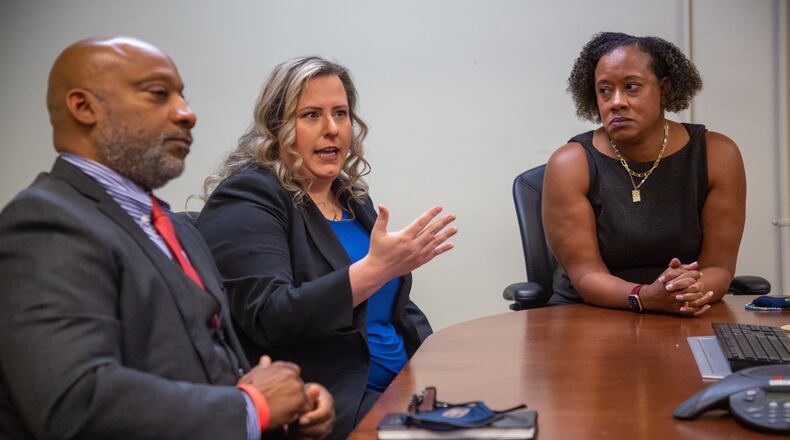A woman woke up parched in the middle of the night in early May 1997 and stumbled to her kitchen in the dark. Grabbing a glass of water, she came face-to-face with a man wielding a knife.
He pushed her to the ground, tied her wrists, then forced her to her bedroom and sexually assaulted her.
They had never met before, according to authorities. But his face would forever be inscribed into her mind. And it would be more than two decades before the woman could stop looking over her shoulder everywhere she went in fear that her attacker was nearby.
The DeKalb County case was suddenly reignited in May 2020 when the DNA collected in a sexual assault kit from that night matched a suspect. After 24 years, authorities finally had caught a break.
The kit was one of nearly 200 that has been returned to county officials from the GBI since the state agency started testing the backlog in 2016, the result of Senate Bill 304 that passed in the Georgia General Assembly. More than 2,400 untested kits were handed over to the GBI at that time after sitting in hospitals and on shelves for months or even years, nearly forgotten.
For this victim, it was finally “a measure of justice,” according to DeKalb County District Attorney Sherry Boston.
“It wasn’t just a Georgia problem, but it was a problem that was discovered in ... many locations across the United States, which is of untested sexual assault kits that were just sitting in hospitals and police stations and never being tested,” Boston said this month in an exclusive interview with The Atlanta Journal-Constitution.
“(The untested kits) essentially resulted in thousands and thousands of victims who really had not had justice or closure in their cases because the critical evidence was just lingering,” Boston said.
The kits are used for gathering and preserving evidence from sexual assaults by collecting a DNA sample. For a match to be possible, a suspect’s DNA must be available for law enforcement, which only happens once it’s put into the FBI’s Combined DNA Index System, or CODIS, when someone is convicted of a crime.
Credit: Steve Schaefer
Credit: Steve Schaefer
Looking at the evidence
Since the age of 26, Courtney Howe had lived his life without authorities ever knowing he was the man responsible for more than two decades of trauma. He was not a career criminal, but he did go to prison for burglaries out of Gwinnett and DeKalb counties for nearly four years before being released in 2006. After that, he moved to North Carolina and started over.
That was until his DNA matched that sexual assault kit from 1997, setting the stage to reopen the investigation.
A police officer in DeKalb was assigned in 2020 to begin piecing together the case while Howe — oblivious to his coming arrest — continued on his daily routine.
In an effort to become better acquainted with the evidence and details, the officer went to the home where the assault occurred almost a quarter-century earlier and planned to contact the victim as soon as possible. While there, he just happened to run into the victim, who was living out of state but kept the home as a rental property, said DeKalb Assistant District Attorney Agatha Romanowski, who was scheduled to prosecute the case.
The officer spoke at length with the woman about the assault, asking her to conjure up the strength to recount an experience buried deep within her. Even though the original evidence was still intact — Investigator Crispin Henry noted that the original investigator “did a phenomenal job obtaining all the records” needed — the case had to be re-examined closely to make sure Howe was responsible.
The evidence against Howe proved to be solid and the arrest warrant was obtained quickly. He was taken into custody the morning of May 22, 2020, at his Franklin, N.C., home by the Macon County Sheriff’s Office and U.S. Marshals Service. At the time of his arrest, Howe was working as a bartender at a brewing company in Franklin.
After Howe was extradited to the DeKalb County Jail, Henry took over the case. Gears shifted, and the goal then became to fill in all the gaps.
Credit: Steve Schaefer
Credit: Steve Schaefer
“You reconstruct the case and you talk to all the victims and witnesses and try to gather as much evidence as you can ... but it is difficult, these cases are two decades, a decade old,” Henry said. “The issue runs when some of the victims and some of the witnesses are deceased and if you don’t have the evidence.”
There were no witnesses, leading Henry to seek other sources to strengthen the case. As part of the original report, the victim’s medical records were available. Retired lab personnel and the victim’s old physician suddenly found themselves in the middle of the case and essential parts in getting her justice.
Difficult memories to share
After compiling what the prosecutors thought was a solid case against Howe, Romanowski reached out to the victim to make sure she wanted to go forward and testify against him.
But she was afraid to see the man again. Afraid it would suddenly bring back all the hurt she worked tirelessly to overcome — and continues to overcome. She did not think she could manage to see him ever again.
So she opted for a victim impact statement to be read to a judge. It took her a month to write, going through several drafts and revisions as she labored through the memories, Romanowski said. She told the prosecutor that she didn’t want the statement to sound like “she was some angry victim.”
“She wanted to make sure she was eloquent enough to make the judge understand how this has affected her,” Romanowski said.
Credit: Steve Schaefer
Credit: Steve Schaefer
It significantly impacted her because she was in the one place she regarded as safe: her home. It’s the scenario that “every woman absolutely fears,” Romanowski said, struggling to explain the severity of such trauma.
“She’s always looked over her shoulder for decades after it, that even going to a gas station, if a man looked at her, she would get nervous and go in her car and leave things like that,” Romanowski said. “She said she tried to obviously live her life the way she could, but she always had that feeling in the back of her mind and not being able to sleep at night.”
Tough cases to prosecute
Howe, now 50, pleaded guilty in August to rape, aggravated sodomy, kidnapping, aggravated assault, burglary, and theft by taking. He was sentenced to 20 years, with 15 to serve behind bars, and is incarcerated at Rutledge State Prison in Columbus.
Though this case did not go to court, Boston and Romanowski noted that winning sexual assault cases can be difficult and that Howe pleading guilty certainly sped up the process.
Credit: DeKalb County Sheriff’s Office
Credit: DeKalb County Sheriff’s Office
“If these cases could be as easy as getting a (DNA) match and calling up the victim, we would be in court all the time,” Boston said. ”They are simply not that simple; they are as complicated as any traditional sexual case, made more complicated by the fact that the case is old and perhaps witnesses, evidence, memories aren’t what they would’ve been had this gone to court just a few months after.
“We have to put a lot more energy and work and effort into these types of cases, in part, because they are so old and we still have to prove these cases beyond a reasonable doubt, which even with DNA evidence is not a slam dunk.”
While countless other victims await justice, one woman can finally be at peace knowing her attacker is behind bars.
About the Author
Keep Reading
The Latest
Featured







